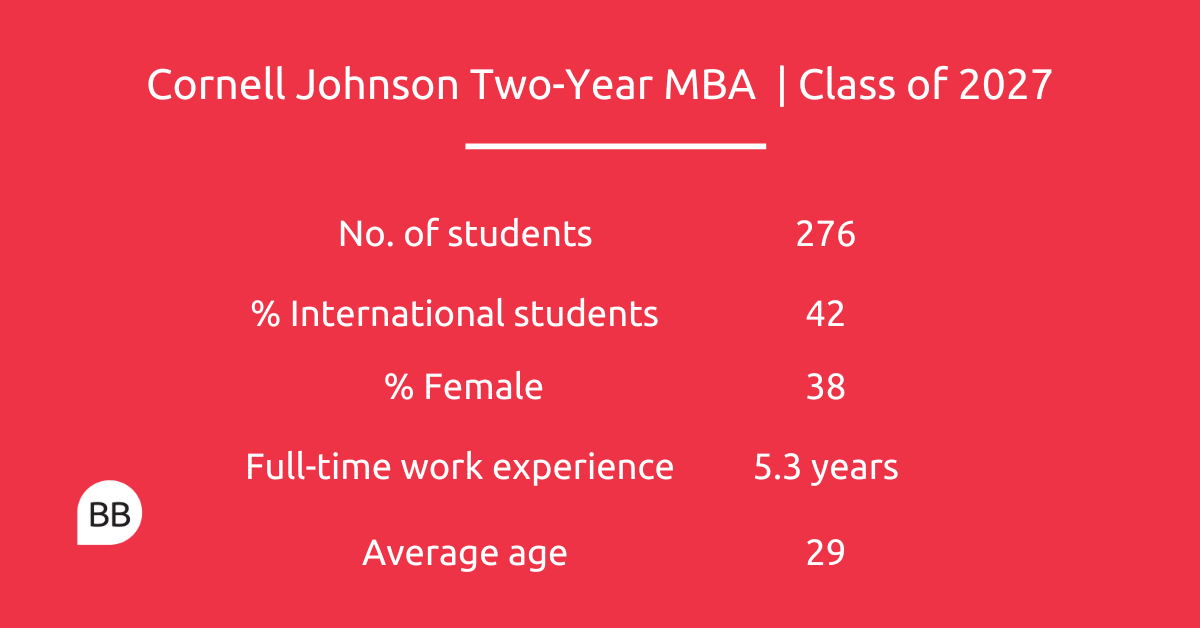One of the prestigious Ivy League schools, Cornell University is a leading global institution with a business school that offers impressive career progression and high salaries.
The Cornell Johnson College of Business is the 13th best business school in the world according to the Financial Times, yet has a higher acceptance rate than many other leading schools.
Read on for a snapshot of the Cornell Johnson MBA class profile.
Cornell Johnson MBA class profile | Overview

Full-time, two-year MBA Class of 2027. Data provided by Cornell SC Johnson College of Business.
Cornell Johnson is known for more intimate class sizes where students can create deeper connections and have more time to engage with faculty. The relatively small cohort of 276 students is unusual compared with other top US MBA programs. For instance, the Wharton MBA class of 2027 has a cohort of 888 students.
Of the Cornell Johnson class of 2027, 38% are women, 26% are underrepresented minorities, and 14% are US military. All of these figures have remained fairly steady in recent years, although the number of female candidates has fallen slightly over the last few years—it was 43% two years ago..
The class of 2027 comprises students from all over the world. Forty-two percent come from outside the US, which represents a slight increase from last year’s figure of 35%.
Cornell Johnson acceptance rates
The acceptance rate of 28% at Cornell Johnson is higher than similarly-ranked schools. The average acceptance rate of the world’s top 10 MBA programs is 24%, which would be even lower if Harvard (11.2%) and Stanford (6.8%) had made the list.
Of those top MBA programs, only Kellogg (29%), INSEAD (30%), and SDA Bocconi (38%) have higher acceptance rates than Cornell Johnson.
If you’re planning to apply to multiple top MBA programs, Cornell Johnson offers you the opportunity to attend a well-respected program with higher odds of admission: a win-win.
GMAT score requirement for Cornell Johnson
In the US, around two-thirds of acceptances to leading business schools are secured with a GMAT score. It remains the most widely-used admissions test that business schools use to evaluate candidates.
It means that finding out the average GMAT score of your target program can give you a good idea of how likely you are to be accepted.
Considering the quality of the program at Cornell Johnson, it’s unsurprising that the MBA class of 2027 boasts a high median GMAT score of 710 (using the 10th edition of the test). For those taking the 11th Edition of the test (having tested from February 2024 onwards), the mid-range of the GMAT scores submitted to Cornell Johnson in 2024-5 was 615-675—according to the GMAT Score Guide.
While that score may sound intimidating, Cornell Johnson’s median GMAT score is lower than many of the top US business schools including Stanford, NYU Stern, MIT Sloan, and Harvard. In fact, when it comes to the average GMAT score at top business schools, only CEIBS has a lower average than Cornell Johnson.
Average GPA score for Cornell Johnson
The median GPA of Cornell MBA’s class of 2027 is 3.4, which is in the high-yet-achievable range.
It’s actually lower than the average GPA scores for top-ranked business schools, which tend to be above 3.5.
Cornell’s admissions committee seems to allow room for brilliant, qualified students who did not earn straight As during their undergraduate careers.
Option of STEM-designated MBA
Cornell’s two-year, full-time MBA offers the option for students to earn a STEM MBA in management science. The STEM designation path’s curriculum emphasizes data analytics, technology, and other subjects integral to contemporary business leadership.
During their third semester, students will have access to over 80 specialized electives, as well as the option to take weekend courses at Cornell Tech in New York City.
This is noteworthy for international students, as those with an F-1 visa who are enrolled in a STEM-designated program currently become eligible for a STEM OPT (Optional Practical Training) extension upon graduation, allowing them to work in the US in an approved STEM field for up to 36 months—compared with the standard 12 months for non-STEM MBA grads.

Cornell Johnson is widely considered to be one of the leading MBA programs in the world, yet it is less competitive and has a smaller class size than many of its contemporaries. Its acceptance rate of 30% is higher than the average of top MBA programs, while its average GMAT of 710 is lower than similar schools.
With a small cohort of just 282 students, the Cornell Johnson MBA can foster close relationships between students and faculty. The class of 2027 also has a diverse mix of students: 38% women, 26% underrepresented minorities, 14% veterans, and 42% international students.
When it comes to job prospects, it’s interesting to note that more than 40% of Cornell Johnson MBA graduates move into the finance industry afterwards. That’s one of the highest proportions of any school in the world, meaning it could be a great option for those looking to break into finance.
For those seeking a top-tier business education with strong career progression and an Ivy League brand—without the intense competition of M7 schools—Cornell Johnson might just be the place for you.



